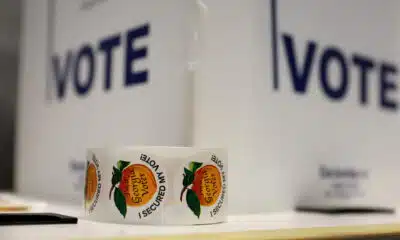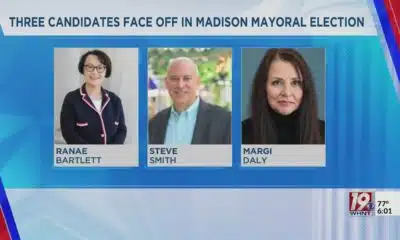News from the South - Texas News Feed
Texas bill seeks to regulate AI’s use in the state
“Texas lawmakers push to regulate AI in government and the tech industry” was first published by The Texas Tribune, a nonprofit, nonpartisan media organization that informs Texans — and engages with them — about public policy, politics, government and statewide issues.
Sign up for The Brief, The Texas Tribune’s daily newsletter that keeps readers up to speed on the most essential Texas news.
With AI tools embedded in everyday life — from customer service chatbots and ChatGPT to predictive policing algorithms — Texas is seeking to place boundaries around the fast-growing technology by imposing a host of rules and appointing “a new sheriff in Texas’ digital town.”
House Bill 149, authored by state Rep. Giovanni Capriglione, R-Southlake, is Texas’ attempt to create guardrails that allow innovation while protecting people from potential harm, said state Sen. Charles Schwertner, R-Georgetown, the bill’s Senate sponsor, at a recent committee hearing.
The bill would require government agencies to disclose when Texans are interacting with an AI system on a state agency website and ban the capture of biometric identifiers without consent — including retina, iris or facial scanning, fingerprints and voice prints. The bill also would prohibit industry from developing AI systems designed to manipulate human behavior and prohibit discrimination and deep fake child exploitation.
The Texas Attorney General’s office would be charged with enforcing the bill, aided by an online complaint system. Violators would face civil fines of up to $100,000.
“I don’t think yet we really need to worry about a Terminator scenario of killer robots,” said Kevin Welch, president of EFF-Austin, a consumer advocacy group that advocates for the protection of digital rights. “I would say it’s important to focus on real harms, which is one thing I do really like about this bill. It focuses on real harms and not hypothetical sci-fi scenarios.”
Supporters say the bill is a necessary first step to prevent harms like racial profiling, privacy violations, or opaque government decision-making. Critics have warned that the bill could stifle innovation and may introduce legal uncertainty if not tweaked to clarify certain language.
David Dunmoyer, the campaign director for Better Tech for Tomorrow at the Texas Public Policy Foundation, a nonprofit research institute based in Austin, says the bill is about “getting AI policy right before the whole horse is out of the barn,” which means getting the “right guardrails and the right regulatory system in place that ensures we’re not just preserving humanity, but advancing it and furthering it.”
He said the bill focuses on outcomes by drawing clear boundaries around what AI should not be allowed to do and increasing transparency.
“Really it boils down to balancing the need for some policy and regulation around this to protect people’s privacy and their transparency and the need to not stifle innovation,” said Sherri Greenberg, an AI expert and assistant dean for state and local government engagement at the UT-Austin. Greenberg added that the attorney general would have the authority to enforce AI regulations regardless of where the AI system is based.
The bill would prohibit government agencies from using AI systems to assign “social scores” or rank people based on personal data. In the private sector, developers would be prohibited from designing AI tools that incite self-harm, violence, or criminal behavior. The bill also would restrict the use of AI to limit a person’s access to political content or infringe on freedom of expression or association.
The bill would also create the Texas Artificial Intelligence Council, housed within the state Department of Information Resources. The 10-member advisory body would monitor AI use across state government, flag harmful practices, recommend legislative updates and identify rules that may be impacting innovation.
For the AI industry, the bill creates a regulatory “sandbox,” a controlled environment where developers can test AI systems free from certain state rules without being penalized. Lawmakers have said the sandbox is designed to balance technological freedom with public oversight.
The bill has been approved by both chambers and is headed back to the House, where representatives will decide if they agree with amendments added by the Senate or need to go to a conference committee to hash out the differences.
If approved, the bill would come with a $25 million price tag and add 20 new full-time staff positions, including 12 in the AG’s office.
Even if the law passes, its impact could be short-lived if Congress steps in. A recent draft of the 2025 federal budget reconciliation bill would put a 10-year moratorium on new state AI laws, which could freeze bills like HB 149 before they take effect. HB 149, if it becomes law, would take effect on Jan. 1.
Would the bill protect citizens harmed by AI?
Dunmoyer, who testified in support of the bill at a recent hearing, said that the bill addresses industry’s concern of getting punished for trying to innovate.
“This bill seeks an environment of compliance rather than punishment,” he said, adding that the bill “provides what the industry has asked for, which is clear rules of the road and protection against a litigious hellscape.”
While the bill offers some flexibility for industry to address potential harms, Welch, president of the consumer advocacy group EFF-Austin, said the bill prohibits private right of action, meaning it blocks citizens from suing companies that violate their rights through AI.
“I feel like [these laws] often end up as being a lot of nice words and sentiments, but the actual rights of citizens aren’t protected,” he said. “I do feel that if we really want to give these laws teeth, we have to make it where citizens can bring lawsuits.”
Dunmoyer said that the bill creates a new online portal where Texans can submit complaints to the attorney general, who he calls “a new sheriff in Texas’ digital town,” to investigate potential violations.
Meanwhile, Anton Dahbura, co-director of the Johns Hopkins Institute for Assured Autonomy, said regulating AI is far more complicated than lawmakers seem to realize. He argues that AI isn’t a single, well-defined entity, it’s really a broad and evolving field of technologies and techniques.
This misunderstanding, he warns, leads to misguided attempts at regulation that may not be enforceable or effective.
Dahbura remains neutral on whether AI should be regulated, but he stresses that any such efforts need to be informed and precise. He suggests that regulation should focus on outcomes — holding people accountable for harm or illegal actions regardless of the tools used — instead of trying to legislate the technology itself.
Dahbura said he also sees a problematic narrative forming around AI as a threat that must be neutralized, likening it to a “pitchforks and torches” approach.
“It feels a little bit like people are marching up the hill to get the bad guy that is AI,” he said. “And if they corner the bad guy, then everything is great.”
The risk of taking regulations too far, he added, is placing unnecessary and ill-conceived burdens on the industry, potentially stifling innovation without offering real protections for people.
Where AI regulation started
Lawmakers have created other advisory bodies aimed at studying the impacts of AI. In 2023, the state approved a bill that created an Artificial Intelligence Advisory Council within the Department of Information Resources to study how AI systems are used in state government, whether they infringe on legal or constitutional rights and recommending ethical guidelines. That council was disbanded after submitting its report to lawmakers in December 2024.
A separate AI and Emerging Technologies Select Committee also made recommendations such as requiring state agencies to audit their AI systems annually, provide state employees with training on AI ethics and data privacy and the formation of an AI sandbox. This recommendation led to HB 149’s sandbox program.
A major concern raised during initial hearings was the deceptive potential of AI — from cloned voices to deepfakes — and how such technologies could undermine democracy and public trust. By mid-2024, agencies were required to report their AI activities to the advisory council, whose findings informed this year’s legislation.
Capriglione, who also championed HB 4, the state’s landmark data privacy law, played a central role. Alongside Sen. Tan Parker, R-Flower Mound, they held meetings with experts in AI, consumer advocacy and technology to figure out what responsible AI governance should look like in Texas. Out of these meetings came a bill by Parker focused on regulating AI within government agencies and Capriglione’s first attempt to regulate AI in the private sector.
Capriglione’s original proposal, HB 1709 — also known as the Texas Responsible AI Governance Act — focused on regulating AI in health care, employment, and finance. It was modeled after the European Union’s AI Act. But the tech industry pushed back, calling it too broad and burdensome.
“Regulating AI in industry is a more difficult proposition,” said Greenberg, the UT-Austin AI expert. “You may get pushback from industry saying that this is going to put us behind or stifle innovation.”
The bill never made it to a House committee. Capriglione came back with HB 149.
Across the country, nearly every state in the country introduced legislation related to AI this year, while others already have laws on the books.
Texas carefully studied Colorado’s AI law, which was signed into law this month and targets AI systems used in decisions related to education, employment, financial services, government services, health care, housing, insurance, or legal services. The bill aims to prevent discrimination based on protected characteristics like age, race or gender.
Texas lawmakers are also considering other AI-related bills during this legislative session, which ends June 2. One would require that political advertisements disclose whether images, audio, or video have been substantially altered using AI. Another bill seeks to prohibit AI-generated child pornography.
Disclosure: The Texas Public Policy Foundation has been a financial supporter of The Texas Tribune, a nonprofit, nonpartisan news organization that is funded in part by donations from members, foundations and corporate sponsors. Financial supporters play no role in the Tribune’s journalism. Find a complete list of them here.
First round of TribFest speakers announced! Pulitzer Prize-winning columnist Maureen Dowd; U.S. Rep. Tony Gonzales, R-San Antonio; Fort Worth Mayor Mattie Parker; U.S. Sen. Adam Schiff, D-California; and U.S. Rep. Jasmine Crockett, D-Dallas are taking the stage Nov. 13–15 in Austin. Get your tickets today!
This article originally appeared in The Texas Tribune at https://www.texastribune.org/2025/05/23/texas-ai-bill-legislation-regulation/.
The Texas Tribune is a member-supported, nonpartisan newsroom informing and engaging Texans on state politics and policy. Learn more at texastribune.org.
The post Texas bill seeks to regulate AI’s use in the state appeared first on feeds.texastribune.org
Note: The following A.I. based commentary is not part of the original article, reproduced above, but is offered in the hopes that it will promote greater media literacy and critical thinking, by making any potential bias more visible to the reader –Staff Editor.
Political Bias Rating: Center-Right
This article presents Texas’ AI regulation bill largely through a lens favorable to Republican lawmakers and conservative think tanks, emphasizing balanced regulation that protects privacy and innovation without overburdening industry. It highlights sponsors from the GOP and includes supportive quotes from groups like the Texas Public Policy Foundation. The tone remains measured, acknowledging critics and nuanced perspectives but framing the legislation as a pragmatic, innovation-friendly approach. While it reports on concerns from consumer advocates and academics, the overall framing leans toward a center-right viewpoint that values market-driven solutions and limited government intervention balanced with necessary safeguards.
News from the South - Texas News Feed
Trump delays mercury pollution rule, helps Texas power plants
“Texas power plants and chemical companies benefit as Trump eases pollution rules, experts say” was first published by The Texas Tribune, a nonprofit, nonpartisan media organization that informs Texans — and engages with them — about public policy, politics, government and statewide issues.
Sign up for The Brief, The Texas Tribune’s daily newsletter that keeps readers up to speed on the most essential Texas news.
The nonprofit publication Capital & Main produced this article. It is co-published with permission.
For Donna Thomas, smokestacks are a typical sight from her home in Fort Bend County. Since she was a child, she has seen the coal and natural gas-powered W.A. Parish Generating Station puff clouds of haze during the day and light up brightly at night. The facility — which has been around since 1958 — is both part of the background and all she thinks about.
Thomas is not alone. For decades, residents have expressed concerns over the pollution emitted from the Parish coal plant — a separate facility from the natural gas plant — and called for its closure. The plant, located about 30 miles southwest of downtown Houston, is ranked by Texas environmental regulators as one of the worst polluters in the state for certain hazardous emissions. These include mercury, a toxic heavy metal particularly harmful for children and pregnant people.
This year, mercury has been top of mind for environmental activists and residents like Thomas. In April, President Donald Trump announced an exemption for companies from implementing stricter Biden-era mercury regulations for two years. Of the 163 eligible coal plants, 11 are in Texas and six have been approved, including Parish’s operator, NRG Energy. In Missouri and Illinois, five coal plants have been exempted, and in Pennsylvania, all 12 of the coal plants seeking approval have been approved.
Then in July, Trump exempted chemical companies for two years from Biden’s 2024 HON Rule, a set of regulations that control hazardous air emissions from chemical plants called the Hazardous Organic National Emission Standards for Hazardous Air Pollutants.
The Trump administration determined the exemptions are in the country’s best interest and represent a burden on industry, and that the technology is not available to meet stricter regulations. Companies like NRG agree.
However, critics say the Biden administration’s 2024 Mercury and Air Toxics Standards — called MATS for short — and the HON Rule were long overdue and the two-year delay in implementing them is merely a tactic to protect industry profit margins at the expense of public health.
Moreover, critics point out that the MATS delay may be giving companies the freedom to ignore toxic air emission rules until the Trump administration repeals the Biden-era regulations altogether. In June, the Environmental Protection Agency under Trump proposed a rule to eliminate the 2024 MATS rule completely.
The two rules together have set off alarm bells for experts and environmentalists in Texas, home to one of the world’s largest petrochemical sectors and 11 coal-powered plants. The exemptions will run from 2027 — when the Biden rules were supposed to take effect — to 2029.
“We know these rollbacks are not good for anyone, especially for those that are community fenceline,” said Thomas, also the founder and president of the Fort Bend Environmental — a grassroots organization focused on environmental justice. “We have around 1,000 homes within three miles of Parish, so that’s going to affect all of them.”
A two-year delay
The EPA has been working on stricter environmental regulations for chemical plants since the early 1990s. Only in 2020 did Biden’s EPA begin drafting new rules in earnest.
But owners of the chemical plants should not act so surprised, said Neil Carman, a former regulator for the Texas Commission on Environmental Quality.
“The chemical industry has known for decades that this was all coming, but they don’t like rules, because it means they have to put on more pollution control and they have to do more leak inspections,” said Carman, now the clean air director for the Texas chapter of the Sierra Club. “These plants will always tell you safety first, safety first, but then you run into this thing called money.”
Of the 79 chemical facilities in Texas requesting exemptions, 15 have been approved, including 13 along the Gulf Coast and the so-called petrochemical corridor.
Carman pointed out that the heads of chemical companies have been in talks with Trump’s EPA since the election. In March, the administration announced that companies could apply for exemption from MATS, HON and seven other sets of emissions standards.
That same month, EPA Administrator Lee Zeldin met with Dow Inc. Chair-CEO Jim Fitterling to discuss regulations imposed by the Biden administration, according to public records and emails obtained by the Sierra Club.
In one email sent on March 17, Dow reps asked to discuss “clarity” on the EPA’s recent announcement that it will reconsider the HON rule and “Dow has met with the Office of Air and Radiation regarding an extension of the current compliance deadline, which is impossible to meet.”
In May, Zeldin met with Fitterling and other chemical company CEOs to discuss the industry at large. Then in July, Trump announced the exemptions for HON, including for two chemical plants in Louisiana and one in Seadrift, Texas, operated by Dow and its subsidiary Union Carbide.
In a statement to Capital & Main, a Dow spokesperson said that “safety and integrity are at the core of both companies’ operations” and the “extensions are appropriate and necessary to address the technical challenges and to ensure the continued safe and efficient operation of these facilities.”
Carman doesn’t buy it. He worked as an environmental regulator in Texas for 12 years. Even then, he said, companies never seemed to be able to find the budget to limit their emissions and chemical leaks. For him, it’s still the cost.
“A lot of these are old plants and so when they go in and do all this work,” Carman said, “they have to find a place where they’re going to put in new controls and they have to engineer it. They have to design it all. It’s months of planning, but these rules were out there. They knew they were coming. They just want two more years of delay.”
Limiting mercury
When the EPA implemented the 2012 MATS rule, mercury emissions dropped 86% — or four tons — in five years.
In 2024, Biden’s EPA approved a rule to strengthen MATS by tightening the emissions standards for mercury by another 70% and reducing pollutants discharged through wastewater from coal-fired plants by more than 660 million pounds per year.
The rule could prevent as many as 11,000 premature deaths, 2,800 cases of chronic bronchitis and 130,000 asthma attacks, according to the EPA under Biden.
However, in April, Trump approved the exemptions for 47 coal-powered plants across the nation. As of mid-August, 70 are now exempted, including Parish.
“These rules were just so critically important to people’s health,” said Surbhi Sarang, senior attorney for the Environmental Defense Fund. The Trump administration “was doing this process that was just not transparent. I mean, there was no process. Whereas in rulemaking, there’s public comment. This is just like a presidential action that was kind of taken in a vacuum and then announced.”
In response to the exemption, Erik Linden, senior director of communications at NRG, said the time is needed and will be used to evaluate the technology for air quality systems and monitoring equipment for compliance.
“All existing MATS emission controls will be properly maintained and remain in service,” Linden said of the current MATS rules that began in 2012. The exemption would give NRG until 2029 to implement the changes.
However, in July, Trump’s EPA proposed eliminating Biden’s rule entirely by the end of the year. Interested parties had three weeks to submit comments, and the Environmental Defense Fund’s request for an extension was denied.
“Rule-making usually takes 12-18 months if not longer,” Sarang said. “They’re moving very quickly.”
All of this is alarming for residents living near industry. With the extent of the changes to environmental regulations coming down from the Trump administration, there’s a lot for Thomas, the Parish generating station neighbor, to process. But she hasn’t given up. Increasingly, Thomas is talking to her neighbors and fellow residents about fighting back.
This means sending letters to representatives in Texas and in Washington, D.C. Thomas said it pays to be loud.
Parish is “going to do the same thing it’s been doing,” Thomas said. “If the EPA does not put a stop to these [emissions] getting out, then everyone is going to pay for this with their lives and in their water and in their air.”
Disclosure: Environmental Defense Fund and NRG Energy have been financial supporters of The Texas Tribune, a nonprofit, nonpartisan news organization that is funded in part by donations from members, foundations and corporate sponsors. Financial supporters play no role in the Tribune’s journalism. Find a complete list of them here.
Copyright 2025 Capital & Main
More all-star speakers confirmed for The Texas Tribune Festival, Nov. 13–15! This year’s lineup just got even more exciting with the addition of State Rep. Caroline Fairly, R-Amarillo; former United States Attorney General Eric Holder; Abby Phillip, anchor of “CNN NewsNight”; Aaron Reitz, 2026 Republican candidate for Texas Attorney General; and State Rep. James Talarico, D-Austin. Get your tickets today!
TribFest 2025 is presented by JPMorganChase.
This article originally appeared in The Texas Tribune at https://www.texastribune.org/2025/08/27/texas-trump-mercury-rule-mats-coal-power-plants-pollution/.
The Texas Tribune is a member-supported, nonpartisan newsroom informing and engaging Texans on state politics and policy. Learn more at texastribune.org.
The post Trump delays mercury pollution rule, helps Texas power plants appeared first on feeds.texastribune.org
Note: The following A.I. based commentary is not part of the original article, reproduced above, but is offered in the hopes that it will promote greater media literacy and critical thinking, by making any potential bias more visible to the reader –Staff Editor.
Political Bias Rating: Center-Left
The content focuses on environmental regulations and critiques the Trump administration’s rollbacks of Biden-era pollution controls, emphasizing the potential public health risks and environmental justice concerns. It highlights the perspectives of environmental activists and regulatory experts who advocate for stricter pollution standards, while portraying industry and the Trump administration’s actions as prioritizing economic interests over health and safety. This framing aligns with a center-left viewpoint that supports stronger environmental protections and regulatory oversight.
News from the South - Texas News Feed
It's a love story: Taylor Swift, Travis Kelce announce engagement
SUMMARY: Taylor Swift and Kansas City Chiefs tight end Travis Kelce are engaged, announcing it on Instagram with a photo of Kelce proposing in a garden and showcasing Swift’s dazzling “Old Mine brilliant cut” ring. The couple, both 35, began dating in 2023 after Kelce attended Swift’s Eras Tour. Despite early challenges, including Kelce’s unsuccessful attempt to give Swift a friendship bracelet with his number, their relationship blossomed. Swift has supported Kelce at numerous games, including two Super Bowls, while Kelce frequently attends her concerts. Their relationship has garnered massive media attention and was featured in ESPN’s documentary “The Kingdom.” Kelce’s parents praise their bond as genuine and deserving.
The post It's a love story: Taylor Swift, Travis Kelce announce engagement appeared first on www.kxan.com
News from the South - Texas News Feed
We're excited for National Dog Day!
SUMMARY: To celebrate National Dog Day, the studio welcomed three dogs: Mac, Sandy, and Leo. Sandy sports a playful lipstick kiss from Kim Castro, while lively one-year-old Leo kept everyone entertained. The dogs’ owners, also producers, shared that it’s usually breakfast, walk, or nap time for them. The studio enjoyed the furry therapy vibe and encouraged viewers to treat their dogs with special offers from PetSmart (buy one, get one 25% off on treats), Lazy Dog Restaurant and Bar (coupon with dog bowl and entree), and free Puppuccinos from Starbucks. Viewer-submitted dog photos added to the joyful celebration of our furry friends.
We had in-studio guests to help us celebrate.
-
Our Mississippi Home7 days ago
MSU Unveils Mixed-Use Development Featuring Boutique Hotel, Cultural Landmark
-
News from the South - Alabama News Feed7 days ago
Grants to boost local emergency alert systems in question as public media agency closes
-
News from the South - Arkansas News Feed6 days ago
New I-55 bridge between Arkansas, Tennessee named after region’s three ‘Kings’
-
News from the South - Arkansas News Feed7 days ago
‘Alligator Alcatraz’ probed by Dems as ICE detention centers multiply in states
-
News from the South - Texas News Feed3 days ago
DEA agents uncover 'torture chamber,' buried drugs and bones at Kentucky home
-
Local News7 days ago
Winged ferry that glides like a pelican tested for coastal transportation
-
News from the South - Louisiana News Feed6 days ago
Families with citizen children deported by ICE sue Trump administration
-
Local News6 days ago
Picayune Police Department increases effectiveness of drug busts, leading to decrease in offenses











































